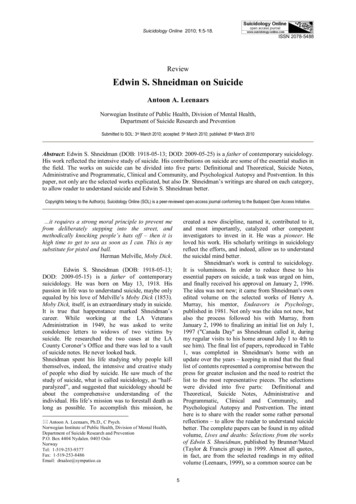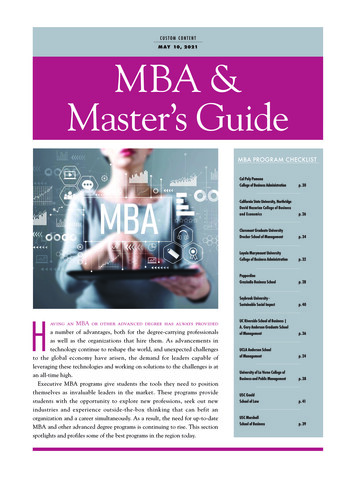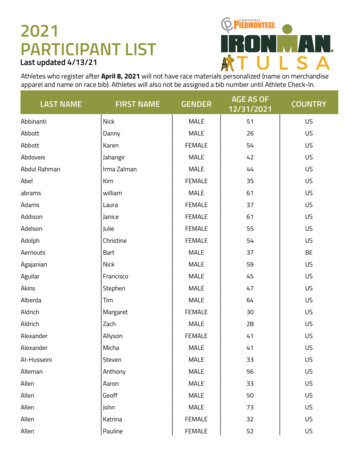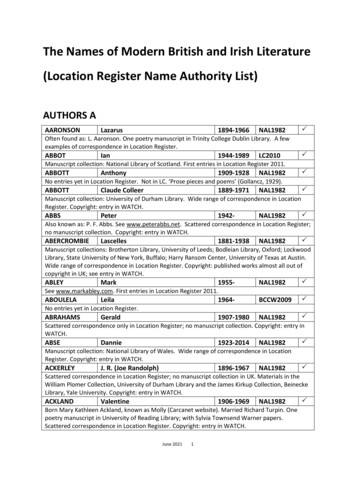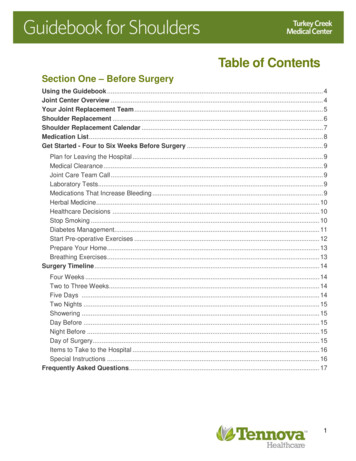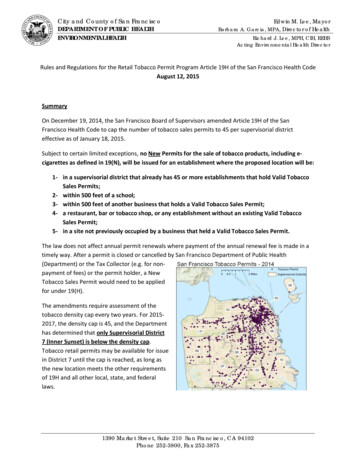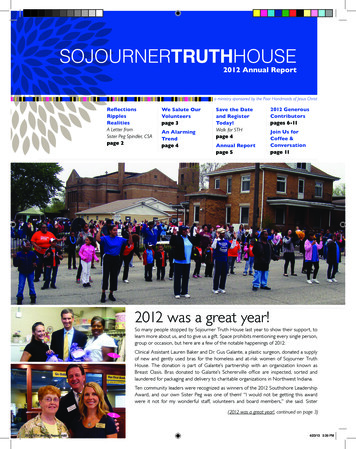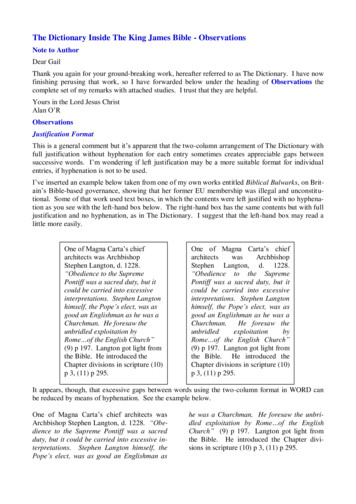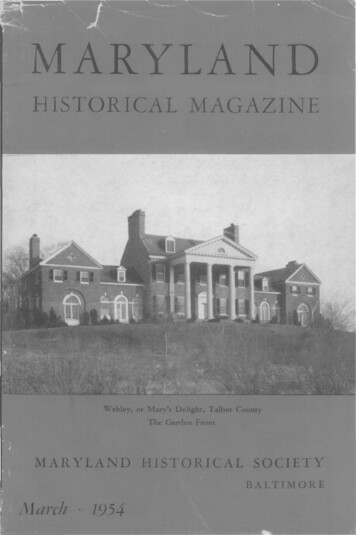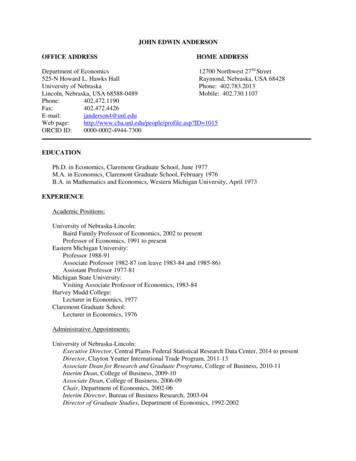
Transcription
JOHN EDWIN ANDERSONOFFICE ADDRESSHOME ADDRESSDepartment of Economics12700 Northwest 27TH Street525-N Howard L. Hawks HallRaymond, Nebraska, USA 68428University of NebraskaPhone: 402.783.2013Lincoln, Nebraska, USA 68588-0489Mobile: il:janderson4@unl.eduWeb page:http://www.cba.unl.edu/people/profile.asp?ID 1015ORCID ID:0000-0002-4944-7300EDUCATIONPh.D. in Economics, Claremont Graduate School, June 1977M.A. in Economics, Claremont Graduate School, February 1976B.A. in Mathematics and Economics, Western Michigan University, April 1973EXPERIENCEAcademic Positions:University of Nebraska-Lincoln:Baird Family Professor of Economics, 2002 to presentProfessor of Economics, 1991 to presentEastern Michigan University:Professor 1988-91Associate Professor 1982-87 (on leave 1983-84 and 1985-86)Assistant Professor 1977-81Michigan State University:Visiting Associate Professor of Economics, 1983-84Harvey Mudd College:Lecturer in Economics, 1977Claremont Graduate School:Lecturer in Economics, 1976Administrative Appointments:University of Nebraska-Lincoln:Executive Director, Central Plains Federal Statistical Research Data Center, 2014 to presentDirector, Clayton Yeutter International Trade Program, 2011-13Associate Dean for Research and Graduate Programs, College of Business, 2010-11Interim Dean, College of Business, 2009-10Associate Dean, College of Business, 2006-09Chair, Department of Economics, 2002-06Interim Director, Bureau of Business Research, 2003-04Director of Graduate Studies, Department of Economics, 1992-2002
John Edwin AndersonPage 2Public Sector Positions:Senior Economist, Council of Economic Advisers (CEA), Executive Office of the President,Washington, D.C., 2005-06.Advised Council members, White House, and other government officials on public finance and taxpolicy. Developed and coordinated economic policy with National Economic Council (NEC),Treasury Department, and Office of Management and Budget (OMB). Council chairmen:Benjamin S. Bernanke, Edward P. Lazear. Council members: Katherine Baicker, Matthew J.Slaughter.Deputy State Treasurer (Taxation and Economic Policy), State of Michigan, 1985-86.Advised Governor James Blanchard, State Treasurer Robert Bowman, and policymakers on stateand federal tax policy. Directed the research and policy analysis activities of the Taxation andEconomic Policy Office (TEPO) of the Michigan Department of Treasury.Research Appointments:Special Sworn Status, U.S. Census Bureau, 2016 to present.SSS and the associated data stewardship training provides access to restricted federal data forapproved research projects under U.S. Code, Titles 13 and 26.Distinguished Scholar (2018 to present), Visiting Fellow (2011-2018), Lincoln Institute of Land Policy,Cambridge, MA.Conduct research projects on land and property taxation; contribute to Institute workshops,seminars, research symposia, grant and training programs.Faculty Research Associate, University of Nebraska-Lincoln, Bureau of Business Research, 2013 topresent.Conduct research projects on state and local taxation and economic policy.Visiting Fellow, Peking University—Lincoln Institute of Land Policy Center for Urban Developmentand Land Policy, Beijing, China, 2010 to present.Conduct research on land market development, land use, and land taxation in China. Teach courseson land economics, taxation, and local public finance to Chinese scholars; provide guest lectures.International Advising, Teaching, and Research:International Instructor, Hangzhou International Urbanology Research Center (HIURC), Hangzhou,China, 2019.Taught executive course on Municipal Public Finance in the joint Lincoln Institute-University ofChicago Harris School of Public Policy course for a class of 70 Chinese scholars.
John Edwin AndersonPage 3International Instructor, International Center for Land Policy Studies and Training, Taoyuan, Taiwan,2017-2019.Taught courses on Local Public Finance in the 134th through 136th Regular Sessions on LandTaxation and Valuation to classes of 25 mid-career professionals from around the world.Advisor, Ministry of Finance, Republic of China (Taiwan), 2018.Advised Ministry personnel on tax policy reforms for personal income tax, corporate income tax,and property taxes.International Business Fellow, UNL College of Business, 2015 to present.Fellows provide faculty oversight to College International Business programs and serve on aninternal advisory board.Advisor, United States Strategic Command, 2014, STRATCOM, Offutt Air Force Base.Invited to provide global economic briefing to Commander Cecil D. Haney, Commander of U.S.Strategic Command, and Executive Team, STRATCOM, Offutt Air Force Base.International Scholar, Open Society Institute (OSI-Europe) International Scholars FellowshipProgram, 2010-11, Mongolia.Selected to work with the Department of Economics in the School of Economics Studies, at theNational University of Mongolia, Ulaaanbaatar, Mongolia. Activities included advising andconsulting on teaching and curriculum reform, and research development through mentoring ofAcademic Fellows Program (AFP) faculty.International Scholar, Open Society Institute (OSI-Europe) International Scholars FellowshipProgram, 2008-10, Tajikistan.Selected to work with the Department of International Economic Relations at the Tajik StateNational University, Dushanbe, Tajikistan. Activities included advising and consulting oncurriculum reform, mentoring of Academic Fellows Program (AFP) faculty, guest lectures, andadvancing academic excellence.Visiting Scholar, Moscow State University, Moscow, Russia, 2004.Invited to teach a graduate course on “Public Institutions and Private Markets” and participate inthe International Symposium on Economic Theory: Historical Roots, Contemporary State andPerspectives on Development held at Lomonosov Moscow State University on the occasion of thebicentennial of the economics department.Fiscal Advisor, Fiscal Reform Project, Republic of Macedonia, 2003.Conducted review of fiscal sustainability analysis, developed analytic tool for assessingMacedonian fiscal sustainability, trained and advised personnel from the National Bank, BudgetOffice, and the Ministry of Finance. Project funded by U. S. Agency for International Development(USAID). Contractor: BearingPoint LLC.Visiting Scholar and Advisor, Partnership Project (NASPAA and NISPAcee), Bulgaria, 2003-04.Developing an Academic Advisor's Practice for Politicians in Economics and Public Finance,Bulgaria (in conjunction with the University of Sofia, National University Center, and the Institute
John Edwin AndersonPage 4of Public Administration). Trained members of Parliament in principles of economics, publicfinance, and the mobilization of academic resources for the enhancement of public policymaking.Senior Fiscal Policy Advisor, Local Government Reform Project, Republic of Moldova, 2000-03.Advised members of Parliament, Ministry of Finance, and local government officials on fiscaldecentralization reforms. Project funded by U. S. Agency for International Development (USAID).Contractor: consortium consisting of Urban Institute, KPMG Barents Group LLC, TrainingResources Group, and Institute of Public Administration.Senior Tax Policy Advisor, Privatization Project, Republic of Montenegro (Federal Republic ofYugoslavia), 2000-03.Advised members of Parliament, Ministry of Finance, and the Department of Public Revenue oncomprehensive tax policy reforms. Coordinated planning of fiscal reform process with World Bank.Project funded by U. S. Agency for International Development (USAID). Contractors: KPMGBarents Group LLC and PricewaterhouseCoopers LLP.Senior Tax Policy Advisor, Fiscal Reform Project, Republic of Moldova, 1998-99.Resident advisor to the Minister of Finance, Ministry personnel, members of Parliament, and otherpolicymakers on taxation and intergovernmental fiscal relations. Developed new property tax titleof the tax code and new law on local public finance. Coordinated project activities withInternational Monetary Fund (IMF), World Bank, EU-TACIS, Swedesurvey, and governmentagencies. Served as Acting Chief of Party, as required. Project funded by U. S. Agency forInternational Development (USAID). Contractor: KPMG Barents Group, LLC.Visiting Scholar and Curriculum Consultant, Russia, 1993.Advised Russian universities Urals State University of Economics (Yekaterinburg), UralsPolytechnical Institute (Yekaterinburg), and Economics Institute (Saratov) on western economiccurriculum development. Lectured on economic theory and policy applications. Program fundedby U.S. Information Agency (USIA).PUBLICATIONSJournal Articles:Anderson, John E. “Real Estate Ownership and Life Satisfaction in Transition Countries,” Journal ofEuropean Real Estate Research, 2019.Park, Junpyo, John Anderson, and Eric Thompson. “Land-Use, Crop Choice, and Proximity to EthanolPlants,” LAND, Volume 8, Issue 8 (July) 2019. https://doi.org/10.3390/land8080118Anderson, John E. “Access to Land and Permits: Firm-Level Evidence of Impediments to Developmentin Transition Countries.” Journal of Economics and Business, Volume 101 (January-February), 2018,pp. 38-57. https://doi.org/10.1016/j.jeconbus.2018.09.001
John Edwin AndersonPage 5Anderson, John E. and Shafiun N. Shimul. “State and Local Property, Income, and Sales Tax Elasticity:Estimates from Dynamic Heterogeneous Panels.” National Tax Journal, Volume 71, Number 3(September) 2018. http://doi.org/10.17310/ntj.2018.3.04Anderson, John E. “Trust in Government and Willingness to Pay Taxes in Transition Countries."Comparative Economic Studies, Volume 59, Number 1(March) 2017, pp. 1-22.DOI:10.1057/s41294-016-0017-xAnderson, John E. and Michael E. Bell. “Connecticut Tax Study Panel: Bold Property TaxRecommendations.” State Tax Notes, January 9, 2017.Chen, Yunmin, Brian Chi-ang Lin, and John E. Anderson. “Environmental Sustainability, and theGreened Samuelson Rule.” Journal of Economic Surveys, Volume 30, Number 3 (July) 2016.Reprinted as, “Environmental Sustainability and the Greened Samuelson Rule,” Chapter 5 inEnvironmental Economics and Sustainability, edited by Brian Chi-ang Lin and Siqi Zheng, WileyBlackwell, Oxford, UK, 2017.Anderson, John E. “Paying the State Use Tax: Is a ‘Nudge’ Enough? Public Finance Review, Volume45, Number 2 (March) 2017, pp. 260-282. Online version, November 4, 03/1091142115614390.full.pdf htmlAnderson, John E. “Economic Reforms and their Impacts on Informal Payments for GovernmentServices in Transition Countries.” International Public Management Journal 21(1), 2018, pp. 163-189.Accepted author version posted online July 13, 2015. Published online November 11, 33Anderson, John E. “Informal Payments to the Tax Collector in Transition Countries.” Ekonomi-Tek,Volume 3, Number 2 (May) 2014, pp. 1-26.Anderson, John E. “Income-Based Property Tax Relief: Circuit Breaker Tax Expenditures.” PublicFinance and Management, Volume 14, Number 2 (June), 2014.Anderson, John E. “Government Debt and Deficits.” Faith & Economics, Number 61/62 (Spring/Fall)2013.Anderson, John E. “Agricultural Use-Value Property Tax Assessment: Estimation and Policy Issues.”Public Budgeting & Finance, Volume 32, Number 4 (December) 2012, pp. 71-94.Anderson, John E. “State Tax Rankings: What Do they and Don’t they Tell Us?” National Tax Journal,Volume 65, Number 4 (December) 2012.Anderson, John E. “US Tax Acts and their Effects on Average Tax Rates.” Applied Economics Letters,Volume 20, Number 2 (May) 2012, pp. 131-134.Anderson, John E. “Financing Urban Development in China.” The Chinese Economy, Volume 42,Number 2 (March-April) 2009, pp. 48-62.
John Edwin AndersonPage 6Anderson, John E., Jeffrey Clemens, and Andrew Hanson. “Capping the Mortgage InterestDeduction.” National Tax Journal, Volume 60, Number 4 (December) 2007, pp. 769-85.Anderson, John E., and M. Mahbubul Kabir “Public Education Cost Frontier Models: Theory and anApplication.” Journal of Education Research, Volume 1, Number 1 (January) 2007, pp. 93-118.Anderson, John E., Atrayee Ghosh Roy, and James R. Schmidt “Housing Tax Deductions and SingleFamily Housing Demand.” International Journal of Applied Economics, Volume 3, Number 1 (March)2006.Anderson, John E. “Taxes and Fees as Forms of Land Use Regulation.” Journal of Real Estate Financeand Economics, Volume 31, Number 4 (October) 2005, pp. 413-427.Anderson, John E. “A Biblical and Economic Analysis of Jubilee Property Provisions.” Faith &Economics, Number 46 (Fall) 2005, pp. 25-41.Anderson, John E., and Őrn Bodvarsson. “Tax Evasion on Gratuities: A Model and Test.” PublicFinance Review, Volume 22, Number 4 (July) 2005, pp. 466-487.Anderson, John E., and Őrn Bodvarsson. “Do Higher Tipped Minimum Wages Boost Server Pay?”Applied Economics Letters, Volume 12, Number 7 (June) 2005, pp. 391-393.Anderson, John E. “Casino Taxation in the United States.” National Tax Journal, Volume 58, Number2 (June) 2005, pp. 303-324.Reprinted in The Economics of Gambling and National Lotteries, edited by Leighton VaughanWilliams. In the series The International Library of Critical Writings in Economics, series editor:Mark Blaug. Edward Elgar Publishing, 2012.Anderson, John E. “On Privatizing State Property.” Economic Problems/Вопросы Экономики, 12(December) 2004, pp. 54-70. (in Russian)Anderson, John E. “Local Development Impact Fees: An Externality-Based Economic Rationale,”State Tax Notes, Volume 31, Number 6 (February 9, 2004), pp. 479-487.Anderson, John E. “Tax Offsets or Netting Operations in Post-Soviet Public Finance.” EmergingMarkets Finance and Trade, Volume 39, Number 3 (May-June) 2003, pp. 27-41.Anderson, John E., Atrayee Ghosh Roy, and Paul Shoemaker. “Confidence Intervals for the SuitsIndex.” National Tax Journal, Volume 56, Number 1, Part 1 (March) 2003, pp. 81-90.Anderson, John E. “Emerging Housing Markets in Moldova.” Journal of Housing Economics, Volume10, Number 3 (September) 2001, pp. 419-428.Anderson, John E., and Atrayee Ghosh Roy. “Eliminating Housing Tax Preferences: A DistributionalAnalysis.” Journal of Housing Economics, Volume 10, Number 1 (March) 2001, pp. 41-58.
John Edwin AndersonPage 7Anderson, John E., and Robert W. Wassmer. “Bidding for Business: New Evidence on the Effect ofEconomic Development Incentives in a Metropolitan Area.” Economic Development Quarterly,Volume 15, Number 2 (May) 2001, pp. 132-148.Anderson, John E., and Marlon F. Griffing. “Use-Value Assessment Tax Expenditures in Urban Areas.”Journal of Urban Economics, Volume 48, Number 3 (November) 2000, pp. 443-452.Anderson, John E., and Marlon F. Griffing. “Measuring Use-Value Assessment Tax Expenditures.”Assessment Journal, January-February 2000, pp. 25-37.Anderson, John E. “Two-Rate Property Tax Effects on Land Development.” Journal of Real EstateFinance and Economics, Volume 18, Number 2 (April) 1999, pp. 181-190.Anderson, John E. “The Itemization Behavior of Taxpayers: Modeling Sample Selection, Censoring,and Endogeneity.” Western Tax Review, 1998.Anderson, John E., and Hendrik van den Berg. “Fiscal Decentralization and Government Size: AnInternational Test for Leviathan Accounting for Unmeasured Economic Activity.” International Taxand Public Finance, Volume 5 (May) 1998, pp. 175-90.Anderson, John E., and Robert W. Wassmer. “The Decision to 'Bid for Business': Municipal Behaviorin Granting Property Tax Abatements.” Regional Science and Urban Economics, Volume 25, Number6 (December) 1995, pp. 739-757.Anderson, John E. “State Tax Credits and Land Use: Policy Analysis of Circuit-Breaker Effects.”Resource and Energy Economics, Volume 15, Number 3 (September) 1993, pp. 295-312.Anderson, John E. “Use-Value Property Tax Assessment: Effects on Land Development.” LandEconomics, Volume 69, Number 3 (August) 1993, pp. 263-269.Anderson, John E. “Land Development, Externalities, and Pigouvian Taxes.” Journal of UrbanEconomics, Volume 33, Number 1 (January) 1993, pp. 1-9.Anderson, John E. “Land Development Timing: Effects of Uncertainty in Income and Tax Policy.”Papers in Regional Science, Volume 71, Number 1 (January) 1992, pp. 45-52.Anderson, John E. “Property Tax Base Income Elasticities: Pooled Estimation of Partial and TotalIncome Effects.” Property Tax Journal, Volume 10, Number 2 (June) 1991, pp. 157-172.Anderson, John E. “Tax Increment Financing: Municipal Adoption and Growth.” National TaxJournal, Volume 43, Number 2 (June) 1990, pp. 155-164.Anderson, John E., and Howard C. Bunch. “Agricultural Property Tax Relief: Tax Credits, Tax Rates,and Land Values.” Land Economics, Volume 65, Number 1 (February) 1989, pp. 13-22.Anderson, John E. “Property Taxes and the Timing of Urban Land Development.” Regional Scienceand Urban Economics, Volume 16, Number 4 (December) 1986, pp. 483-492.
John Edwin AndersonPage 8Anderson, John E. “On Testing the Convexity of Hedonic Price Functions.” Journal of UrbanEconomics, Volume 18, Number 3 (November) 1985, pp. 334-337.Anderson, John E. “The Changing Structure of a City: Temporal Changes in Cubic Spline UrbanDensity Functions.” Journal of Regional Science, Volume 25 (August) 1985, pp. 413-425.Anderson, John E. “Estimating Generalized Urban Density Functions.” Journal of Urban Economics,Volume 18, Number 1 (July) 1985, pp. 1-10.Anderson, John E. “The Choice between Income Tax and Land Tax in Danish Municipalities: AComment.” Public Finance/Finances Publiques, Volume 39, Number 2 (June) 1985, pp. 292-295.Anderson, John E. “Cubic Spline Urban Density Functions.” Journal of Urban Economics, Volume 12,Number 2 (September) 1982, pp. 155-167.Anderson, John E. “A Comparison of the Predictive Ability of OLS and RIDGE Coefficients inProperty Valuation.” Property Tax Journal, Volume 16, Number 4 (December) 1981, pp. 187-193.Anderson, John E. “Ridge Estimation of House Value Determinants.” Journal of Urban Economics,Volume 9, Number 3 (May) 1981, pp. 286-297.Anderson, John E. “Ridge Regression: A New Regression Technique Useful to Appraisers andAssessors.” The Real Estate Appraiser and Analyst, Volume 45, Number 6 (November/December)1979, pp. 48-51.Journal Reviews and Comments:Review of Federalism and Economic Reform: International Perspectives (edited by Jessica Wallackand T.N. Srinivasan), Comparative Economic Studies, Volume 51, Number 2 (June) 2009, pp. 269-70.“Viewpoint: Looking Back, Looking Forward: Twenty-Fifth Anniversary Remembrances of theAssociation of Christian Economists.” Faith & Economics, Number 52 (Fall) 2008, pp. 5-6.Review of Economics in Christian Perspective: Theory, Policy and Life Choices (by Victor V. Claarand Robin J. Klay, published by InterVarsity Press, 2007), Faith & Economics, Number 50 (Fall) 2007,pp. 122-26.Comments on “Multiple Listing Sales Data as an Indicator of Market Behavior: Prices, Volume andSub-market Activity” (by S. W. Hamilton and D. Dale-Johnson) Property Tax Journal, Volume 10,Number 2 (June) 1991, pp. 199-202.Review of Property Taxes and House Values (by J. Yinger, H. Bloom, A. Bőrsch-Supan, and H. Ladd,Academic Press, 1988), Journal of Economic Literature, Volume 28, Number 1 (March) 1990, pp. 98100.
John Edwin AndersonPage 9Review of The Parameters of Urban Fiscal Policy (by T. J. McDonald, University of California Press,1986), Southern Economic Journal, Volume 55, Number 1 (July) 1988, p.225-226.Review of Rebuilding America's Cities: Roads to Recovery (P. Porter and D. Sweet, eds., Center forUrban Policy Research, Rutgers University, 1984) Southern Economic Journal, Volume 53, Number 1(July) 1985, pp. 282-284.Books, Textbooks, and Monographs:Use-Value Assessment of Rural Land in the United States, Lincoln Institute of Land Policy, Cambridge,MA, 2014. (with Richard W. England)Public Finance: Principles and Policy, Second edition. Cengage Learning, 2012.Public Finance: Principles and Policy. Houghton-Mifflin Publishing Company, 2003.Bidding for Business: The Efficacy of Local Economic Development Incentives in a Metropolitan Area,W. E. Upjohn Institute for Employment Research, Kalamazoo, Michigan, 2000. (with Robert W.Wassmer)Fiscal Equalization for State and Local Government Finance. Praeger Publishers, Westport,Connecticut, 1994.Contributing authors: John E. Anderson, Michael Bell, Thomas Downes, Richard Dye, J. FredGiertz, Helen Ladd, William Oakland, Thomas Pogue, Andrew Reschovsky, and MichaelWiseman.Chapters in Books and Monographs:“Environmental Sustainability and the Greened Samuelson Rule,” (with Brian Chi-ang Lin and YunminChen) Chapter 5 in Environmental Economics and Sustainability, edited by Brian Chi-ang Lin and SiqiZheng, Wiley Blackwell, Oxford, UK, 2017.“Casino Taxation,” Chapter 2 in the Oxford Handbook of the Economics of Gambling, edited byLeighton Vaughan-Williams and Donald Siegel, Oxford University Press, Oxford, UK, 2013.“Collecting Land Value through Public Land Leasing.” Chapter 6 in Value Capture and Land Policies,edited by Gregory K. Ingram and Yu-Hung Hong, Lincoln Institute of Land Policy, Cambridge, MA,2012.“The Path to Property Taxation,” Chapter 8 in China’s Local Public Finance in Transition, edited byJoyce Yanyun Man and Yu-Hung Hong, Lincoln Institute of Land Policy, Cambridge, MA, 2010.“Land Value Taxation: Review of the Evidence,” Chapter 6 of Land Value Taxation and EconomicDevelopment, edited by Richard Dye and Richard England, Lincoln Institute of Land Policy,Cambridge, MA, 2009.
John Edwin AndersonPage 10“Fiscal Indicators,” Chapter 4 in The Design and Use of Political Economy Indicators, edited by KingBanaian and Bryan Roberts, Palgrave Macmillan Ltd, New York, NY, 2008.“The U.S. Tax System in International Perspective,” Chapter 5 of the Economic Report of the President,2006, U.S. Government Printing Office: Washington, DC. (with co-authors).“Circuit Breaker,” entry in the Encyclopedia of Taxation and Tax Policy, Second Edition, edited byJoseph J. Cordes, Robert D. Ebel, and Jane G. Gravelle, Urban Institute Press, Washington, D.C., 2005.“Public Education Cost Frontier Models: Theory and an Application,” Progress in Economics, Volume9, Nova Science Publishers, 2005(with M. Kabir). Reprinted in Progress in International, State andLocal Public Finance, Nova Science Publishers, 2006.“Tax Evasion in a Transition Economy: Theory and Empirical Evidence from the Former Soviet UnionRepublic of Moldova,” Progress in Economics Research, Volume 8, edited by Albert Tavidze, NovaScience Publishers, 2004 (with L. Carasciuc).“Preferential Assessment: Impacts and Alternatives,” Chapter 3 in The Property Tax, Land Use andLand Use Regulation, edited by Dick Netzer, a volume in the series Studies in Fiscal Federalism andState-Local Finance, series editor Wallace E. Oates, published by Edward Elgar Publishing Inc.,Northampton, MA, (series editor, Wallace Oates), 2003.“Circuit Breaker,” entry in the Encyclopedia of Taxation and Tax Policy, edited by Joseph J. Cordes,Robert D. Ebel, and Jane G. Gravelle, Urban Institute Press, Washington, D.C., 1999.“Taxation and Economic Justice,” Chapter 9 of Toward a Just and Caring Society: Christian Responsesto Poverty in America, edited by David P. Gushee, Baker Books, Grand Rapids, Michigan, 1999.“Reducing Reliance on the Property Tax in Education Finance,” Chapter 5 of Fiscal Equalization forState and Local Government Finance, edited by John E. Anderson, Praeger Publishers, Westport,Connecticut, 1994, pp. 127-150.“Public Financing Approaches to Improve Access to Health Care: Alternative Revenue Sources,”Chapter 7 of Improving Access to Health Care: What Can the States Do?, edited by John Goddeerisand Andrew Hogan, W. E. Upjohn Institute for Employment Research, Kalamazoo, Michigan, 1992,pp. 183-206.Chapters in Magill's Survey of Social Science: Economics, Frank N. Magill, editor, Salem Press,Pasadena, California, 1991:“Tax and Taxation,” pp. 2237-2242,“Tax Rate: Marginal,” pp. 2243-2248,“Tax: Value-Added,” pp. 2231-2236,“Marginal Utility,” pp. 1357-1362,“Housing Economics,” pp. 981-986.
John Edwin AndersonPage 11“Biblical Principles Applied to Federal, State, and Local Taxation Policy,” Chapter 6 of ApplyingBiblical Principles to Public Policy, edited by Richard C. Chewning, Navpress, Colorado Springs,Colorado, 1991, pp. 127-142, and 319-321.Publications in Conference Proceedings, Commentaries in Books, and Other Publications:“Household Mobility and Local Government Finance in US Cities,” Proceedings of the 111h AnnualConference of the National Tax Association, 2018. (with Wenjing Li and Matt Cushing)“Temporal and Spatial Effects of State Taxes on Economic Growth,” Proceedings of the 110h AnnualConference of the National Tax Association, 2017. (with Jennifer Bernard)“What Accounts for the Resilience and Stability of Property Tax Systems?” Proceedings of the 109thAnnual Conference of the National Tax Association, 2016.“Housing and Mortgage Acquisition with Favors in Transition Economies,” European Real EstateSociety, Book of Proceedings 23rd Annual Conference, Regensburg, Germany, June ngs.pdf8“Use-Value Assessment of Rural Land: Time for Reform?” Fair & Equitable, April 2016. (withRichard W. England)“Taxpayers Shortchanged by Agriculture Use-Value Assessment,” Expert Commentary in U.S. Newsand World Report, August 24, 2015. (with Seth Giertz)“Land Lease Revenue and Urban Public Finance: Evidence from Chinese Cities.” in Proceedings ofthe 2011 International Symposium on China’s Urban Development and Land Policy, PekingUniversity-Lincoln Institute Center for Urban Development and Land Policy, Beijing, China,forthcoming.“Tax Increment Financing, Spillovers, and School District Revenue,” National Tax Association—Proceedings of the One Hundred Fourth Annual Conference 2011. (with Jennifer A. Bossard)“The Economics of Casino Taxation in Major World Gambling Markets,” Topical Issues of Tax Policy(актуальны проблемы налоговой политики). (April) 2012, pp. 23-28. (with Dalerjon Mirpochoev,in Russian).“Tax Policy and House Price Dynamics,” National Tax Association--Proceedings of the One HundredSecond Annual Conference, 2009.“The Chinese Municipality Land Leasing Problem,” All China Economics International ConferenceProceedings, December 2009.Commentary on “Homeowners’ Associations and their Impact on the Local Public Budget,” by RonCheung in The Changing Landscape of Local Public Revenues, edited by Gregory K. Ingram and YuHung Hong, Lincoln Institute of Land Policy, Cambridge, MA, 2010, pp. 367-370.
John Edwin AndersonPage 12“Assessing Measures of Fiscal Sustainability for Tajikistan,” Proceedings of International Conferenceon International Finance, Tajik State National University, 2008.“Reflections on Writing a Public Finance Textbook,” National Tax Association--Proceedings of the100th Annual Conference on Taxation, 2007, pp. 340-342.Commentary on “Increasing Use and Variety of Residential Property Tax Relief Measures and theirImpact on Property Taxes,” by John H. Bowman in Erosion of the Property Tax Base, edited by NancyY. Augustine, Michael E. Bell, David Brunori and Joan M. Youngman, Lincoln Institute of LandPolicy: Cambridge, MA, 2009, pp. 111-115.“Financing Urban Development in China,” All China Economics International ConferenceProceedings, December 2007.“Tax Bribes in Transition Countries,” National Tax Association--Proceedings of the Ninety-NinthAnnual Conference 2006, forthcoming. Reprinted in the ICFAI Journal of Public Finance, 2007.“Real Estate Taxes and Fees: Impacts on Urban Land and Housing Development in China,”Proceedings of the Second International Symposium on Urban Development and Land Policy in China,Lincoln Institute of Land Policy and Peking University Shenzhen Graduate School, October 2006, pp.1-11.“On Privatizing State Property,” Economic Theory: Sources and Perspectives, Symposium onEconomic Theory: Historical Roots, Contemporary State and Perspectives on Development held atLomonosov Moscow State University on the occasion of the bicentennial of the economics department,April, 2006. (in Russian)“Local Development Impact Fees: An Externality-Based Economic Rationale,” National TaxAssociation--Proceedings of the Ninety-Sixth Annual Conference 2003, pp. 279-288.Playing PowerBall? National Tax Association--Proceedings of the Ninety-Fifth Annual Conference,2002, pp. 377-382 (with James R. Schmidt).“Tax Reform Challenges in what is Left of Yugoslavia,” National Tax Association--Proceedings of theNinety-Fourth Annual Conference, 2001, pp. 311-319.“Estimation of Public Education Cost Frontier Models: Theory and an Application,” BalancingFederal, State, and Local Roles in Education, American Education Finance Association, 25th AnnualConference Abstracts and Program Descriptions, March 2000.“Are Local Economic Development Incentives Effective in an Urban Area?” National Tax AssociationProceedings of the Ninety-Second Annual Conference 1999 (with Robert W. Wassmer), pp. 469-480.Reprinted in State Tax Notes, February 14, 2000.“Tax Policy for Economic Growth in Moldova,” Proceedings of the Conference on Budgetary andFiscal Reform in the Transition Period, Center for Budgetary and Financial Analysis, Chisinau,Moldova, December, 1998.
John Edwin AndersonPage 13“Economics and the Evangelical Mind, Bulletin of the Association of Christian Economists, Issue #28,Fall 1996, pp. 5-24. (with George Langelett)“City Income Tax Adoption,” National Tax Association--Proceedings of the Eighty-Sixth AnnualConference, 1994, pp. 147-52.“Income Elasticities of Real Estate Values,” Proceedings of the Sixth Annual Technical Seminar onContemporary Problems in Assessment and Appraisal, International Association of Assessing Officers,Chicago, Illinois, 1990.Government Publications--selected:“Direct Property Tax Relief,” report for the State of Connecticut Tax Panel, 2015.“Two-Rate Property Taxes and Urban Development,” Intergo
M.A. in Economics, Claremont Graduate School, February 1976 B.A. in Mathematics and Economics, Western Michigan University, April 1973 EXPERIENCE Academic Positions: University of Nebraska-Lincoln: Baird Family Professor of Economics, 2002 to present Professor of Economics, 1991 to present
